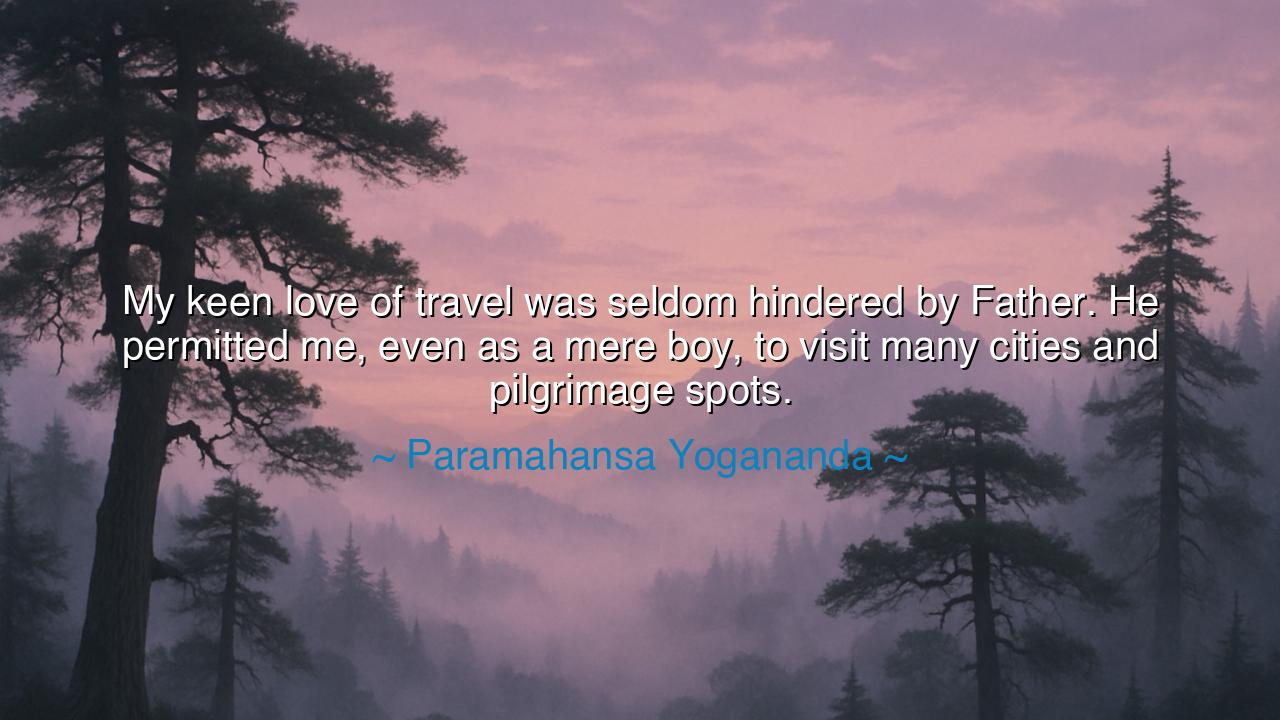
My keen love of travel was seldom hindered by Father. He
My keen love of travel was seldom hindered by Father. He permitted me, even as a mere boy, to visit many cities and pilgrimage spots.






Paramahansa Yogananda, sage and teacher of the modern world, once spoke with gratitude and reverence: “My keen love of travel was seldom hindered by Father. He permitted me, even as a mere boy, to visit many cities and pilgrimage spots.” At first, these words seem simple—a son recalling the kindness of his father. Yet in their depth lies a profound teaching: that the wanderings of youth, if blessed with freedom and guidance, can awaken the soul to truths that remain hidden to the stagnant heart.
When Yogananda speaks of his keen love of travel, he names the fire of curiosity that burns in the young and in the wise alike. To travel is not merely to change one’s location but to open the eyes, to behold the variety of creation, to taste of life’s many colors. That his father allowed him, even as a boy, to wander through cities and pilgrimage spots shows a wisdom rare among parents—that sometimes the greatest gift is not protection, but permission, not sheltering, but freedom to seek.
The mention of pilgrimage spots reveals the spiritual nature of these journeys. For in India, the land of Yogananda’s youth, pilgrimages are not mere tourism, but acts of devotion. To walk where saints have walked, to kneel where holy men prayed, is to drink from the well of eternity. Even as a boy, these sacred sites would have stirred his spirit, planting seeds of the divine calling that later blossomed into his worldwide mission. His father’s permission was not only an earthly allowance, but an opening of the gates to destiny.
History, too, offers many examples of youth who wandered far and were transformed. Recall the tale of the young Siddhartha, who left the palace to see the world beyond its gilded walls. In his encounters with suffering, sickness, and death, he found the truths that birthed the path of the Buddha. Or think of the youthful Alexander, who, under his teacher Aristotle, journeyed across lands before ever commanding armies. Travel shaped his vision of empire, teaching him the breadth of cultures and philosophies. So too did Yogananda, in his youthful wanderings, gather wisdom that prepared him to one day guide seekers across the world.
Yet there is also a gentleness here: the father’s role. Many fathers in their fear might have restrained a child, saying, “Stay home, be safe, the world is dangerous.” But Yogananda’s father understood that the boy’s spirit was already aflame with divine longing. By granting freedom, he nurtured courage, responsibility, and the spirit of discovery. His trust became the soil in which greatness grew. Thus, the quote reminds us that guidance is not always control, but sometimes release.
The meaning, then, is twofold. First, for the child: seek the road, for the world itself is a teacher. Do not be afraid to wander, for in wandering you will discover yourself. Second, for the parent or mentor: do not suffocate the curiosity of the young. Instead, guide it, bless it, and permit it to bloom, for in doing so you may be shaping a soul that will one day serve humanity.
So, O seeker of wisdom, learn from Yogananda’s remembrance. Cultivate your own keen love of travel—not always through distant journeys, but through openness to new experience, new thought, and new devotion. And if you are a guide to others, be like his father: allow freedom, tempered by trust, so that the soul may grow strong. For it is often in early journeys, in small pilgrimages of youth, that the seeds of destiny are sown.
Thus, let this truth be engraved upon the heart: “He permitted me, even as a mere boy, to visit many cities and pilgrimage spots.” May we all, in our youth or in our age, continue to travel—whether across lands or within the depths of the spirit—seeking always the wisdom that waits along the road.






AAdministratorAdministrator
Welcome, honored guests. Please leave a comment, we will respond soon